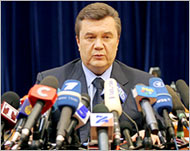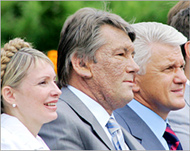Ukraine: A divided nation
The issue of national identity is proving to be a contentious – if not divisive – question for Ukrainians a year after they overthrew their former government in the Orange Revolution.

The issue is now being debated a lot more openly with profound political repercussions.
“Are we to be ‘little Russians’ or are we to be an independent state, European and Western in its outlook?” asks Vadim Kornelov, a tour operator in downtown Kiev.
“That’s the question we keep having to ask ourselves.”
This debate is also likely to be a core issue ahead of parliamentary elections, scheduled for March.
Supporters of the Orange Revolution, who want a Ukraine that is part of the European Union and Nato, will be pitted against a faction which still looks to Russia as the country’s natural ally.
Bouncing back
The identity issue has emboldened former prime minister Viktor Yanukovich, who was ousted from office in the revolution, to run as a pro-Russia candidate in the March elections.
 |
|
Former prime minister Viktor |
His Party of the Regions seeks the formation of a “common economic space”, comprising Belarus, Kazakhstan, Russia and Ukraine.
He launched his election campaign not from Kiev, the Ukrainian capital, but from Moscow.
Yanukovich recently gained a narrow poll lead over the Orange Revolution’s leaders – current president, Viktor Yushchenko, and former prime minister, Iulia Timoshenko – partly because of a corruption scandal which broke in September.
Out of steam
The polls seem to indicate that the revolutionary ideals may have run out of steam.
“A year ago, we weren’t just choosing a new leadership, but the future path of the nation,” says Nina Sorokopud, one of the main activists in the Orange Revolution youth movement, Pora.
She says the revolution acted as a catalyst in birthing national Ukrainian pride.
“They found a reason why it is good to be Ukrainian. People used to ask, ‘where is Ukraine’? Now everyone knows. The revolution was the first step in building a common, Ukrainian society.”
Divisions
But that future path may have fallen prey to ethnic and geographical divisions.
 |
|
Polls indicate waning support for |
Professor Valery Khmelko of the Kiev International Institute for Sociology says: “When you look at where the most popular political parties have their supporters, they are almost all geographically either on one side of the country or the other – east or west.”
In the west, there is the greatest support for the Orange Revolution’s leaders while in the east, supporters gather more around Yanukovitch.
Russian ties
“Most of Yushchenko’s supporters are also mono-Ukrainian in terms of ethnicity, whereas Yanukovitch’s supporters are often bi-ethnic, with Russian and Ukrainian parents and relatives,” said Khmelko.
“They [Yanukovitch’s supporters] want an open border with Russia, not Europe, as that’s where their relatives live. If Ukraine were in the EU, that border would be closed.”
The two halves of Ukraine also have different histories – with parts of the west formerly belonging to Poland, Czechoslovakia and Romania until after the second world war.
The east had long been part of the Soviet Union, and before that, of the Russian empire.
Historical issues
Russia’s control of the Ukraine during that period has also become a political battleground in the run-up to the elections.
This year, for the first time, the president attended ceremonies to mark the Ukrainian famine of 1932-33, during which 8-10 million people died, according to Ukrainian government figures.
 |
|
Ukrainians remember the 8-10 |
Ukrainians considered the famine the construct of Soviet leader Joseph Stalin in his efforts to requisition food to sell abroad for hard currency and to crush the Ukrainian peasantry.
In a speech before a crowd assembled for the commemoration of the anniversary of the Orange Revolution, Yushchenko called on a court of history to punish the state system which allowed the famine.
Paul Miazga of the local newspaper, Kiev Post, says: “In the past, this event, which Ukrainians call the Holodomor, was not given such prominence, as clearly, no one wanted to upset the Russians.”
Now though, it has received official backing and a campaign is under way to have the Holodomor recognised internationally as an anti-Ukrainian genocide. The Lithuanian parliament recently voted to accept this definition.
Fork in road
“History is obviously a way in which national identity is often formed or built. Yushchenko has seen that there is a political card to play in this,” says Miazga.
|
“The economy is still bad… People are very poor still. When they look at Moscow, at the standards of living there, they think it must be better. Next March, there’s another fork in the road. We could go either way, it’s impossible to tell” Vadim Kornelov, |
Meanwhile, the lack of economic progress, and the collapse of support for further enlargement within the EU, have left the revolutionaries’ support dwindling, while many wonder what it was all for.
“The economy is still bad,” says tour operator Kornelov.
“We expected a lot of Western money to come after the revolution, but it didn’t.
“People are very poor still. When they look at Moscow, at the standards of living there, they think it must be better. Next March, there’s another fork in the road. We could go either way, it’s impossible to tell.”